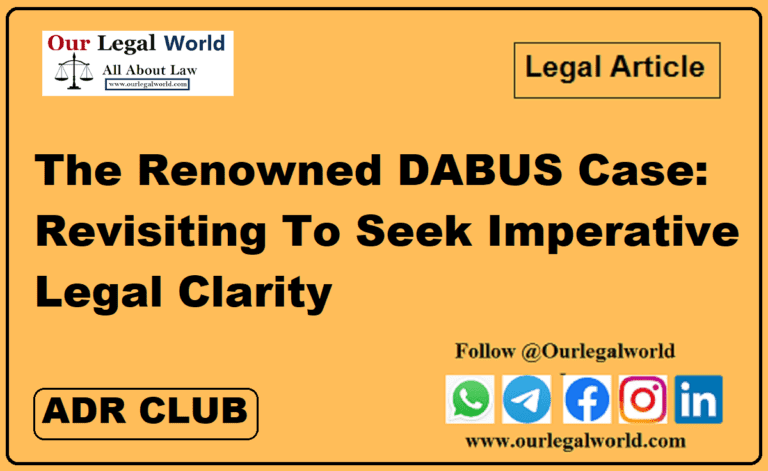The University Of Mysore And Anr vs C. D. Govinda Rao and Anr:- Case Analysis
Equivalent citations: 1965 AIR 491, 1964 SCR (4) 576
Bench: Gajendragadkar, P.B., Subbarao, K., Wanchoo, K.N., Ayyangar, N. Rajagopala, Mudholkar, J.R.
Date of Judgement: 26 August, 1963
Petitioner: THE UNIVERSITY OF MYSORE AND ANR.
Respondent: C. D. GOVINDA RAO AND ANR.
Relevant Act: Writs-Quo Warranto, Art. 226- Jurisdiction of the High Court to interfere. Scope of Appointment of Reader by Board of Appointments of Mysore University-Constitution
FACTS –
The petition was documented by C. D. Govinda Rao, in the Mysore High Court under article 226 of the Constitution. C.D. Govinda Rao needed by that petition, that a writ of quo warranto ought to be given, to call upon Anniah Gowda to show the authority under which he was clasping the post of a Research Reader in English in the Central College, Bangalore. The respondent furthermore implored for a writ of mandamus or other suitable writ or bearing calling upon the University of Mysore to designate him Reader.
The University of Mysore, Appellant no. 1, promoted welcoming applications for 6 posts of Professors and 6 posts of Readers. Among them were incorporated the post of an Educator of English and of a Reader in English. Applicants for the post of Reader were required to have
- A first or high inferior Master’s Degree of an Indian University in the subject;
- A Research Degree of Doctorate standard or distributed work of an elevated requirement and
- Experience of showing post-graduate classes for 10 years in instance of professors and 5 years subjecting to that of Readers.
- And independent research in the case of Readers the understanding of provincial language Kannada is considered a desired qualification. Inclination will be towards applicants who have had experience in teaching and have also done advanced research work.
According to the respondent the appointment of Anniah Gowda to the post of Research Reader was illicit in the face of the prescribed qualifications and that he was qualified to be appointed to that post. Anniah Gowda, litigant no.2, was chosen by a Board of Appointment which was composed to analyse the competency of the candidates and he was selected a Reader in English in the Central College, ‘Bangalore. His dispute was that the arrangement of Anniah Gowda was unlawful in the face of the recommended qualifications.
Thus, he wanted that the nomination of Anniah Gowda must be revoked. He therefore asked for a writ to direct the University to employ him for that post.
Also Read: Rupan Deol Bajaj and Anr vs. Kanwar Pal Singh Gill and Anr
Issues raised-
- Whether writs of quo warranto can be issued by the court in this case?
- Whether it was up to the High Court to revoke the position of appealing party No. 2 regardless of whether it was indicated that either of the capabilities validated by the ad distributed by appealing party No. 1 was not fulfilled by him?
Observations and Assertions-
- The court saw that the judgment of the High Court doesn’t specify that the consideration of the High Court was attracted to the technical nature of the writ of quo warranto which was appealed by the respondent in the current procedures, and the conditions which must be fulfilled before a writ could issue in such procedures.
- The court saw that at no stage it seems to have been asked by the respondent under the watchful eye of the High Court that the frailty in the selection of appealing party No. 2 continued from the way that the statutory standards and ordinances made by appellant No.1 had been disobeyed.
- Mr. S. K. Venkataranga Iyengar, for the respondent fought that the appointment of Anniah Gowda was made in negation of the statutory rules and ordinances outlined by the university. He tried to contend that he had alluded to the statutory rules and ordinances in the High Court, at the same time, unfortunately, the equivalent had not been referenced or talked about in the judgment.
- The court concisely demonstrated the discoveries recorded by the High Court before looking at the benefits of the disputes brought by the appellants up in these appeals and saw that in concluding that appealing party No. 2 didn’t fulfil the first requirement, the High Court is clearly at fault.
- The court saw that the High Court didn’t consider the inquiry with respect to whether it would be proper for the High Court to vary from the assessment of the Board when all things considered, the Board may have taken the view that the Degree of Master of Arts of the Durham University which appealing party No. 2 had gotten was proportional to a high Second Class Master’s Degree of an Indian University.
- The court saw that the High Court was in mistake in presuming that since appellant No. 2 couldn’t be said to have made sure about a high Second Class Master’s Degree of an Indian University, he didn’t fulfil the first qualification.
- The court saw that the appealing party’s teaching experience of the recommended character is considerably more than five years which is the base set.
Judgement-
- The court held that the High Court was at fault in issuing a writ of quo warranto, suppressing the appointment of appellant No. 2.
- The court permitted the appeal and the order passed by the High Court was set aside
- It was held that there’ll be one set of hearing fees in both the appeals filed by the 2 appellants.
- The writ petition filed by the respondent was dismissed with costs throughout.
Case Comment-
The writ of quo warranto proceeding help in affording a judicial remedy by which a person, who holds an independent substantive position or franchise or liberty, is named upon to point out by what right he holds the said office, franchise or liberty, in order that his title thereto could also be duly determined, and just in case the finding is that the holder of the office has no title, he would be ousted from that office by judicial order.
This implies at the end of the day, by the methodology of quo warranto, the judiciary is enabled to control the executive from making an appointment to public office against the authorised law. It additionally assists with shielding a citizen from being denied of public office to which he has a right. These proceedings likewise will in general guard the public from usurpers of public office, who may be permitted to proceed either with the collusion of the Executive or in view of its lack of concern.
It will, therefore, be seen that an individual needs to make the court believe, that the office being referred to is a public office, and is held by a usurper without legal authority before the person can successfully assert or claim a writ of quo warranto. He additionally needs to demonstrate that it would unavoidably prompt the inquiry with respect to whether the appointment of the alleged usurper has been made by law or not.







